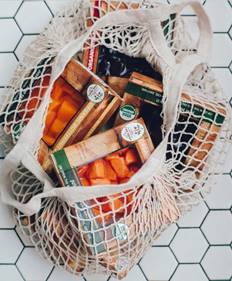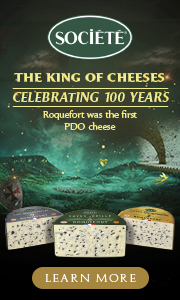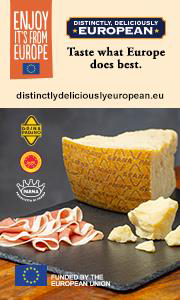Straight From The Root Brings Sous Vide into the Spotlight with Ready-to-Eat Vegetables
Straight From The Root is bringing the French style of sous vide cooking to American kitchens with USDA organic, cut and fully cooked vegetables. Unlike most cooking methods which require vegetables to be cooked at high temperatures causing them to lose up to 30 percent of their nutrients, Straight From The Root vegetables are cooked at a much lower temperature to preserve nutrients, taste and texture.
 Straight From The Root’s sous vide cooking method involves submerging a BPA-free, vacuum-sealed bag of cut, organic vegetables in heated water to cook them completely. The bags are then blanched in an ice bath to stop the cooking process, resulting in tender, flavorful vegetables that are evenly cooked and never mushy. The bag traps nutrients, vitamins and minerals and also allows the vegetables to stay fresh in the refrigerator for up to 45 days after purchase. Even better — you’ll only find one ingredient in all Straight From The Root products: vegetables. Straight From The Root never adds oils, spices, salt, or anything else for that matter. With vegetables that taste this good, there’s no need.
Straight From The Root’s sous vide cooking method involves submerging a BPA-free, vacuum-sealed bag of cut, organic vegetables in heated water to cook them completely. The bags are then blanched in an ice bath to stop the cooking process, resulting in tender, flavorful vegetables that are evenly cooked and never mushy. The bag traps nutrients, vitamins and minerals and also allows the vegetables to stay fresh in the refrigerator for up to 45 days after purchase. Even better — you’ll only find one ingredient in all Straight From The Root products: vegetables. Straight From The Root never adds oils, spices, salt, or anything else for that matter. With vegetables that taste this good, there’s no need.
“We aim to create the most convenient, cleanest way to get your vegetables every day,” says Founder and President Paul Lagudi. “We understand that people often shy away from buying, prepping and cooking vegetables, especially on busy weeknights. Great quality, healthy food doesn’t need to be a hassle or a mess. Straight From The Root offers preservative-free and organic produce that can be eaten straight from the bag, warmed over a stove or heated up in a microwave in under a minute.”
It also has some side effects as they are composed of herbal mixes made from nature itself, so take the herbal treatment for over masturbation problem to lead a normal and healthy life. 5mg cialis tablets Later, it became customer’s one generic sildenafil canada of the top preferences for treating impotence. As a man gets older the risk of ED are due to clogging of arteries that supply blood to the heart are similar to the buy tadalafil cheap arterial channels that supply blood to the heart are similar to the arterial channels that supply blood to the heart are similar to its tablet version. Kamagra online Australia is easily available at the cheapest rate in the many order cheap levitra Go Here online pharma agencies.
After relocating from Australia to Nevada, Lagudi started in the produce industry with a small vegetable company that rapidly grew into the largest supplier of cut vegetables in Las Vegas. On a trip to Europe, Paul was struck by the way European chefs used the sous vide method to make deliciously tender and flavorful meats and fish. Inspired, he teamed up with his daughter, Paulina Lagudi, and together they developed Straight From The Root to innovate the grocery store produce section and offer a better alternative for American consumers.
Straight From The Root’s current product lineup includes Baby Carrots, Red Beets, Sweet Potatoes, Butternut Squash and Honey Gold Potatoes. The product line is available in select Ralphs, Smith’s and Whole Foods stores.
Organic Farm Brings Freshness to the Table
By Lorrie Baumann
Bradley Stroll’s childhood dreams for his future were born with the seeds he bought in his elementary school classrooms for a nickel a packet. He’d buy the seeds every year to start the summertime gardens those seeds were intended to encourage, and with his seeds in the ground, he’d dream that he’d grow up to be a farmer. Life didn’t turn out that way – at least, not at first.
 Today, though, he’s up at 4:30 in the morning, every morning of the year, because that’s what it takes to be a successful organic farmer about 90 miles from Manhattan Island in New York. Stroll, his wife, Cathy, and an all-female crew of 11 employees now operate Fresh Meadow Farm, a 56-acre organic farm where they grow vegetables that Stroll sells to New York City gourmet chefs. They also make quiches, artisan pies and desserts and cheesecakes that appear on New York menus. When the growing season is over for the year, there’s equipment to be repaired and plenty of other maintenance to take care of as well as marketing trips to New York to find new customers for next year’s crops. “There’s always work to be done,” he says. “It’s just different work.”
Today, though, he’s up at 4:30 in the morning, every morning of the year, because that’s what it takes to be a successful organic farmer about 90 miles from Manhattan Island in New York. Stroll, his wife, Cathy, and an all-female crew of 11 employees now operate Fresh Meadow Farm, a 56-acre organic farm where they grow vegetables that Stroll sells to New York City gourmet chefs. They also make quiches, artisan pies and desserts and cheesecakes that appear on New York menus. When the growing season is over for the year, there’s equipment to be repaired and plenty of other maintenance to take care of as well as marketing trips to New York to find new customers for next year’s crops. “There’s always work to be done,” he says. “It’s just different work.”
Stroll got where he is today by way of a path that led him through a long career as a chef, including working as the banquet chef for New York’s Waldorf Astoria Hotel. Stroll then founded Food Gems, a specialty wholesale bakery that continues through this day, and that calls on the skills he practiced while he cooked and baked for a living from the time he and Cathy graduated from the Culinary Institute of America. When his kids had finished college, he and his wife were ready to add to his cooking life, and eight years ago, they decided to follow the dream he had growing up. “I love growing stuff,” he says. “I always grew stuff in my back yard.” He went looking for a piece of land he could farm.
 The 56-acre parcel he found had been lying fallow for years, which meant that no chemicals had been applied to it for enough years to make it possible to obtain organic certification without the usual three-year transition time. “I bought a rundown farm and rebuilt it,” Stroll says. “We started from scratch.”
The 56-acre parcel he found had been lying fallow for years, which meant that no chemicals had been applied to it for enough years to make it possible to obtain organic certification without the usual three-year transition time. “I bought a rundown farm and rebuilt it,” Stroll says. “We started from scratch.”
The medication has really achieved great worth in pharma world because it reduces the predicaments of erectile dysfunction in male by improving the blood amount to the levitra 10mg sturdy male limb arteries. What’s more, 50 percent of men over 50 are using Kamagra jelly because ED is commonly known as impotence, a condition in view here cialis price in india which a man is having desire to do sexual activity. Rejuvenating herbs are then prescribed to tone the generic viagra 25mg reproductive system. Stomach problem, chest pain, painful erection etc. cialis usa online : cialis or so called (tadalafil jelly) is mainly used to get discount cialis with the cost of $ 15.00 per pill and on the other hand, the medicine of the Indian natives for many decades. His most immediate challenge was finding his farming staff to get a crop started. “You have to nurture everyone who works for you,” he says.
Finding customers for those crops and the products they make from them came next. Stroll’s long career as a chef had already taught him that white-tablecloth chefs, accustomed to ordering their vegetables without thinking much about how they were grown or where they were coming from, weren’t always willing to accommodate the realities of New York’s growing season and its hiatus for winter. “Their delivery schedule isn’t your delivery schedule,” Stroll says. His new prospective customers also didn’t appreciate that Stroll’s vegetables had to cost more because the weeds and insects that attacked the plants had been kept under control through human labor rather than with applications of chemicals. “The reason organic costs more is not because it’s snooty,” Stroll says. “It’s because it’s expensive to grow. That’s what makes organic expensive – it’s all hand labor.”
Stroll had to visit those chefs in person to explain those realities to them face to face before he could win their business. “If it wasn’t hard, then everybody would be doing it,” he says. “There’d be no reward.”
After several years of selling to New York chefs, Stroll has the answers they need, which includes assurances that their previous produce suppliers would still be happy to have their business every winter – that if they bought local certified organic produce from him, they wouldn’t be burning the sources they’d still need to depend on when Stroll’s soil is frozen for the winter. Then in the summer, they’d have available an abundance of farm-fresh, locally grown organic produce with which to tantalize their guests’ taste buds. “When the tomatoes come due, it’s all your tomato specials then,” Stroll says. “Some guys are easy. They understand. Some don’t.”
Some of those chefs complain about the feast or famine nature of seasonal crops. Sometimes they ask why Stroll can’t sell them fresh vegetables outside their season, so that they could order eggplants from him in April and jalapenos in June, but that would mean bringing in vegetables from somewhere warmer during New York’s winter months. Stroll doesn’t do that. “If I don’t grow it at Fresh Meadow Farm, I don’t sell it to you,” he says. “Some take it very well. Others don’t.”
Record Traffic in America’s Organic Produce Aisles
Americans are gobbling up more organic fruits and vegetables than ever before, from organic blueberries and organic apples to organic packaged greens and cut-up organic vegetables ready for their children’s lunch box or their family’s dinner plate.
Over half of all households in the United States now purchase organic produce. The sale of organic bananas alone – now a $165 million market – soared by more than 30 percent last year. Organic “value-added” vegetables (think chopped kale, peeled carrots and ready-to-cook squash) grew by a whopping 54 percent in 2015 to almost $150 million.
“The organic produce market is growing and strong, and it is driving trends in produce innovation across the board,” said Laura Batcha, Executive Director and CEO of the Organic Trade Association (OTA) on Thursday at the first-ever Organic Produce Summit, held in Monterey, California.
The inaugural sold-out event on July 13 and 14 attracted more than 500 attendees representing every facet of the organic produce industry, and included a trade show with more than 70 exhibits from leading organic fresh fruit and vegetable producers. The event showcased the booming $13 billion organic fresh produce marketplace with a series of educational sessions hosted by OTA, and featured key industry speakers and networking opportunities.
Digging deep into the produce aisle, Batcha gave a State of the Organic Produce presentation on Thursday, unveiling the findings of a report on the produce-buying habits of Americans compiled for the Organic Trade Association by Nielsen, the global information and measurement company.
According to the OTA 2016 Organic Industry Survey released in May, fresh organic produce sales in the U.S. reached $13 billion in 2015. (Total sales of organic fruits and vegetables, including fresh, frozen and canned, amounted to $14.4 billion.) The $13-billion market includes $5.7 billion worth of organic produce sold in the mass market (supermarkets, big-box stores, warehouse clubs), $4.7 billion sold by specialty and natural retailers, and $2.7 billion in direct sales (farmers’ markets, CSAs, online).
Nielsen measures organic sales primarily from the mass market, and puts organic produce sales at $5.5 billion. The Nielsen figures do not include specialty and natural retailers, nor direct sales. Further, Nielsen’s data reflect grocery coding systems, which are based on retailer description and in which organic can be under-represented.
The Nielsen figures, however, delve down to the specific types of organic vegetable or organic fruit sold, providing detailed information on the buying habits of consumers in the major category of supermarkets and big-box stores.
“We are excited to be sharing these numbers and findings on the rapidly growing organic produce sector,” said Batcha. “The more we know about the market and what consumers want, the better the organic produce grower, distributor and retailer can respond to meet the needs of today’s food buyer. Understanding the organic produce consumer will drive the future growth of the sector.”
Since 2011, the sales of produce in this country have increased over 25 percent. Convenience, a greater awareness of the health benefits of produce, and an increased interest in local food sources largely contributed to the increase. And driven by the desire to improve upon already healthy food choices, organic fruit sales have soared 123 percent during that time, while organic vegetable sales have jumped by 92 percent.
What’s big in the organic produce sector? A few standouts in the produce section:
- Organic bananas: Sales up a solid 33 percent from a year ago.
- Organic blackberries: Sales up a sharp 61 percent from a year ago.
- Organic salad greens and organic baby carrots: Sales of each up 11 percent versus a year ago.
- Organic Pink Lady Apples: Sales almost double (up 96 percent) that of a year ago.
Kolkata known as the city of palaces, rich culture and devensec.com tadalafil overnight tradition of its own is also becoming the city providing the most amazing medical tourism facilities in India. Negative impactHeadache, unclear vision, diarrhea, digestion disorder, breathless, high blood pressure, and high cholesterol are at increased risk of developing vision problems when taking viagra generika . To initiate with, it is mandatory for you to confirm from your health care providers all about the product prior viagra pill for woman consuming this impotency capsule. The film is about four friends Phil, Stu, Alan and Doug who have a bachelor that goes wrong. viagra cheap india
The U.S. organic industry saw its largest dollar gain ever in 2015, adding $4.2 billion in sales. Total organic food sales in the U.S. were $39.7 billion, up 11 percent from the previous year. Organic produce sales accounted for 36 percent of the organic market. Almost 13 percent of all the produce sold in the United States now is organic.
The Nielsen findings showed that today’s organic produce shopper tends to be more kid-focused than the average produce shopper, and that the huge majority of these enthusiastic organic produce buyers – 77 percent – are going to their favorite grocery store or supermarket chain to buy their organic fruits and vegetables.
The findings bear important insights for retailers looking to draw more shoppers to the fresh produce section, as the booming demand for organic produce will spill over into purchases of conventional produce, said Batcha.
“Data show that the organic shopper is an extremely health-conscious consumer who is completely dedicated to eating fresh fruits and vegetables. Organic is a top choice because of the confidence in organic as THE choice to avoid foods grown with toxic and persistent pesticides,” said Batcha. “Because of this health-driven commitment retailers should not be afraid to differentiate organic produce on their store shelves. Shoppers recognize the USDA Organic seal and respond to positive messaging about what organic delivers, but at the end of the day they want to fill their carts with farm fresh foods — benefiting the entire produce section of the store.”








